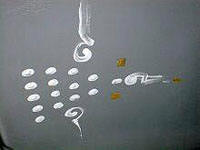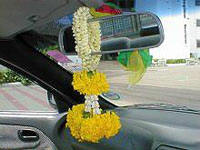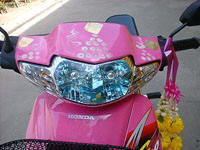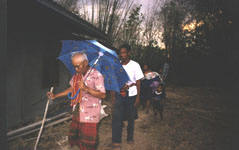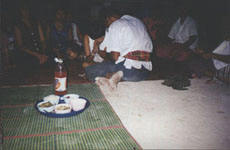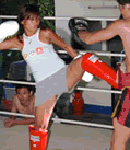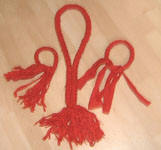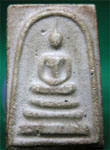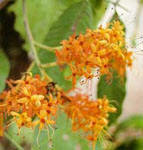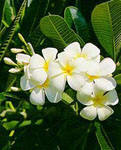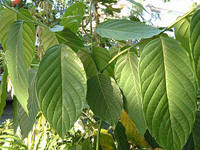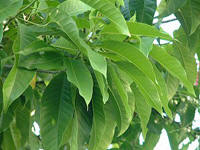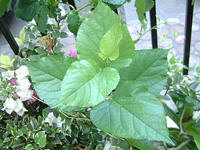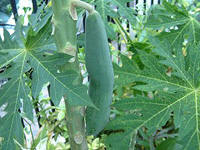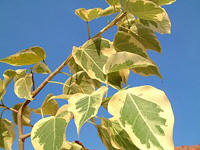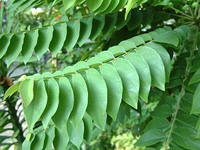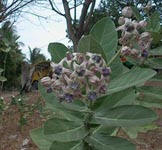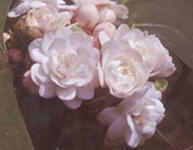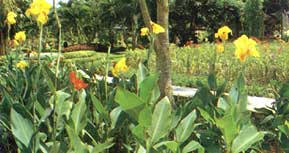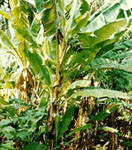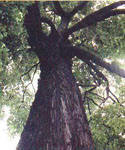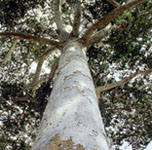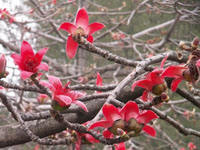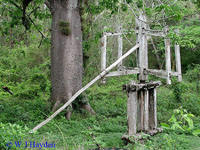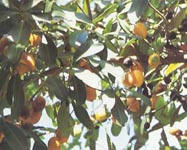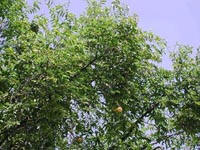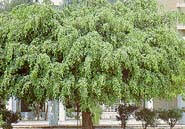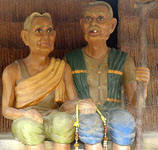![]()
THAI SUPERSTITIONS
Asian cultures are known for their superstitions and spirit worship. In Thailand, especially in the more remote regions such as island communities, a belief in the supernatural permeates almost every aspect of daily life. The Thai language is full of idioms and sayings that recognise a wider cosmic order, words such as: chok (luck), duang (astrological power), pee (spirits) kam (karma), sawan (heaven), and phromlikit (fate) are part of many popular phrases that often spill from the Thai tongue. According to Thai spirituality, what happens to us in this life is determined not only by our actions in previous lives, but also by external powers and supernatural forces which are largely beyond human control. As a consequence of these forces, every place is powerful, and has the potential to be dangerous, and it is therefore necessary to continually protect oneself, and others, from harm, sickness, and misfortune. There are spirits that dwell in every corner, and they are thought to control our luck, danger, and calamity, and so it is that even though many Thai people reject the existence of such entities, they do not dismiss them. There is a popular Thai saying which roughly translates: "Even if you don't believe in something, no one is sure. Surely it is better not to ridicule those things that are uncertain". Many Thai superstitions stem from ancient Animist beliefs that pre-date even Buddhism. Such religions were once prolific throughout Asia, and in modern day China, for example, the worship of spirits, dragons, and an immense array of gods easily matches similar practices here in Thailand.
Spirit houses are actually the most prominent indication of the importance that belief in the spirits plays in everyday Thai life. Outside every Thai home, hotel, hospital, or office building there is always a modest but brightly painted house, carefully positioned at a level that is slightly higher than the eye line of a standing person. This is the home of Phra Phum, the Lord of the land, and when a new home is to be built, the first thing Thai people do is to find a suitable place in the garden for the spirit house. Selection of the exact spot for this dwelling can only properly be done by someone well versed in spirit lore, and these special souls are believed to able to communicate directly with the other side. The house must face either north or south, but preferably north, and must not be located where the owner larger house overshadows it otherwise the spirits will not come to live in it. Once divined, a post is set up at the chosen site, and the little house is perched on top. It generally contains a single room with an outer terrace, where daily offerings to the guardian spirit are placed. A symbolic picture of the spirit is also carved on a small piece of wood inside the little house, with its back to the wall, and at the time of installation, food, fruit, candles, incense, and flowers are placed on a table before the shrine, while the spirit is invited to come and make his home there and to protect the property and the residents of the new house. From that day onwards, fresh flowers, incense, and candles are regularly placed on the small gallery outside, and specially prepared food is offered to the spirits on important occasions such as the anniversary of the building, birthdays, deaths, and the lunar New Year.
Images of the Lord Buddha are also often placed inside a separate spirit house, which is erected on a nearby spot. In fact, the orange robed monks who follow the path of the Buddha are thought themselves to be invested with power to protect people, and monks can be called upon to offer a blessing, or to say prayers for individuals and families that find themselves facing a crisis or a change in circumstances. At some temples around the country, even the trees inside the grounds are believed to house special spirits. It is not uncommon to find trees that contain Buddha images, with saffron-coloured cloth wrapped around the trunk as it would be wrapped around a monk. This is symbolic of the respect for the spirits that have influence in the area, and the ritual clearly demonstrates that Buddhism and spirit worship exist side by side. Teak trees were once particularly revered as the sacred residence of guardian spirits, and to cut them down was to destroy the home of sentient beings with the power to provide protection and grant wishes. Teak wood was only used in the construction of temples and palaces, as it was believed the material would provide a link with the unseen natural world. Permission was therefore required from the King himself, if a private individual wished to build their house from such an important product. Even today, many local people believe that those who cut down trees only for material gain will be punished by the spirits that dwell within. Such beliefs clearly demonstrate that over the centuries, Buddhism and spirit worship have come to exist in side by side, with base consumerism considered to blindly ignore both at its peril.
Thai Buddhism relies heavily on story and legend, and there are a number of ghost stories that have been handed down through generations, some of them from even older religions. Ghosts are often linked to nature and its elements: air, earth, fire and water, and Thai people are genuinely afraid of these ‘Phi’, rarely talking about them in case they are summoned. "Phi Pop" is one such evil spirit, and came from an old legend in which a Prince who was fond of magic, found the way to enter people’s bodies and take control over them. He was also able to enter the bodies of animals, and one day while he was inside a bird, his servant repeated the incantation he had heard his master use, and entered the body of the Prince himself, thus becoming the Prince. The bird-prince flew to tell his wife what had happened, and she destroyed the servant's original body, and then challenged her false Prince to enter the body on an animal. Unable to resist the chance to show off his power, the servant entered an animal, allowing the real Prince to re-enter in his own body, and leaving the servant without one of his own to return to. Since then, the spirit of the servant goes from one body to the next, eating the insides of the victims as revenge for the trickery.
Other bad spirits include Phi Am‚ who sleeps on the chest and causes victims to experience difficulty breathing, and Phi Kraseu‚ who is often represented as a woman whose body is cut open with her intestines spilling out, and likes to frequent unclean areas. Then there is Phi Tai Hong, a spirit that died a violent death, usually either murdered or involved in a crash. It is thought that the swiftness of the death surprised the victim, and left their spirit sad and angry. Finally the most powerful of all ghosts "Phi Tai Hong Tong Klom" is the spirit of a pregnant woman, and she is more potent and fearsome than the others because she has the anger of two people to bear. This ghost also comes from a famous legend that tells of a woman called "Mae Nak" who was married to a soldier posted to a remote place. She was already pregnant when he left home, and unbeknown to her husband, she died with the baby still inside her body. The woman quickly returned as a spirit, however, and started to frighten all her neighbours, even killing some people and drinking their blood. Everybody was afraid of her, but she still loved her husband deeply and when he finally came back home she was waiting for him. The villagers warned him that his wife was dead, and that he was living with a ghost, but he did not believe them until one day while "Mae Nak" was preparing the dinner, a lemon fell from her hand and she reached a full two meters lower than the house's floor to retrieve it. Her husband saw this, and realising that his wife was a ghost managed to flee from the house. A monk then went to the house and managed to imprison the spirit in a bottle, which he threw into the river, but two fishermen trying to catch some fish retrieved the bottle and accidentally freed "Mae Nak" who returned to her husband, and killed the woman he was living with. Today the grave of this feisty female ghost can be found at a shrine in Bangkok, inside which there a statue of Mae Nak‚ covered with gold leaves. Toys, flowers, dresses, children‚ clothes, and food for the baby are offered at the shrine, and Thai mothers always warn their daughters to come home after school. If not "Mae Nak" might catch them.
The monk in the above story was a Mor Phi‚ or spirit doctor, and in Thailand these people are often employed to help get rid of ghosts and curses, as well as to reveal the future, find people a mate and bestow luck upon a household or enterprise. Spirit doctors can be ordinary people with special powers known as Palang Chit, or they may also be monks. However, the monastic orders no longer tolerate such practices, and if monks are found to be delving into magic and spirit worship, they are expelled from the temple. The biggest concentration of spirit doctors takes place every September on Phuket at the annual Vegetarian festival. During this event, practitioners pierce their bodies with sharp objects, or walk on fire to prove their powers. They show no pain, and in this way demonstrate the power of the spirit that inhabits them. The festival has strong links with Chinese religion and beliefs, but there are also many other Thai rituals and events designed to appease or seek favour with the spirits, and these are still practiced in many parts of the country.
Kaan Tham Phum‚ is a ritual held on auspicious occasions such as a wedding, an ordination, or a house-warming. Some households hold this ritual annually, and it is commonly organized on a Saturday or a Tuesday. During the ritual, special offerings are made to all kinds of gods and angels, after which participants pay homage to the Lord Buddha and their ancestors. Holy water is prepared, which is believed to give blessings to participants and protect them from evil, and at the end of the ritual, people offer tickets made from large leaves found in the woods, strategically placing them in eight different directions. The ceremony is believed to bring good luck to the house owners, and is therefore usually done when strange incidents have taken place in the house such as when lightening strikes a tree, a large snake enters, or when family members fall sick.
The ritual of Karn Bucha Thian‚ can be held any time of the year. The purpose of this ceremony is essentially to tell a person fortune, and it is usually conducted by a monk, or an elder who has been in the monkhood. The monk first makes two special candles, then recites incantations that directly refer to the person who asked for the ritual, and lights each flame. One candle removes bad luck, while the other is to promote longevity. The monk is able to read the flames, and a bright, long-lasting blaze signifies good fortune, while flickering flames and crackling candles are a bad omen. If the flames are only twinkling, or go out altogether, this means the person is facing very bad luck indeed, even death. This ritual is generally held when somebody feels there may be possible misfortune ahead, for example when he or she has been in an accident, had a bad dream, is involved in a dispute, or is ill. In addition, ‚ÄòKarn Bucha Thian is also held when predictions of bad fortune have been made by others, as well as on a birthday and during the Thai New Year festivities.
Fortunately, not all Thai spirits are bad, and Phi Fa for example, is one that can treat ailing patients. The Lam Phi Fa is a ritual performed to help those people suffering from mental disorders, or those suffering from psychosomatic illnesses. This ritual unites all the family members, and a medium arranges offerings for spirits, and also studies the illness, including its causes and severity. If the illness is the result of a minor mistreatment by a particular spirit, that spirit is asked to accept an apology, which is usually accompanied by an offer to follow the spirit wishes. This part of the ritual is called Lam Song. However, if the illness is serious, Phi Fa will be invited to treat the patient himself, and a musician will play a wind instrument called a kaen‚while the medium dances to invite Phi Fa to the scene, walking around the offerings that have been laid out. When the spirit arrives, it is said that everyone shakes uncontrollably, before eventually losing consciousness. Phi Fa then explains the best way to treat the patient, and promptly returns to the other side. There is no doubt that the rituals such as those mentioned above are an important link with the spirit world for Thai people.
The Tourism Authority of Thailand, in one of its publications on Thai culture, says that even the nation’s major festival, the Ploughing Ceremony, is strongly linked with esoteric beliefs of Brahmin origin. In fact, the auspicious day and hour of the ceremony are still set by royal astrologers today. But sadly, the reasons local people have for turning to the spirits are not the same as they once were. In the past, spirits were worshiped in the sense of showing gratitude and respect to an unknown higher power. Today, however, people often fall foul to the whims of fraudulent monks, mediums, and shamans in a desperate attempt to win the lottery, cure a debilitating illness, or to protect their children when they leave home to work in big cities or foreign countries. In modern Thailand, the range of paraphernalia available to guard against evil is so vast that it would take a book to describe them in full. Thai men believe in the power of tattoos, nearly everyone wears some form of holy amulet that protects them against everything from bullets to accidents, special symbols or Yan are drawn on cars, taxis, temples, and the doors of houses to protect the occupants, and garlands of flowers hang from the rear view mirrors of cars to prevent the driver crashing the vehicle. Even the temple is considered a dangerous place at night, with ghosts and spirits wandering around the grounds while the monks sleep. Statues of giants called "Yak" often stand in front of temples to frighten these spirits away, while at the same time protecting the precious Buddha statues inside.
"Wen kam", is the phrase used by local people to describe the results of bad actions in the past. Their obvious fear of retribution and evil in this life, suggests that many feel they have done wrong in a previous one. Buddhist belief, however, offers rewards as well as punishments, and it should not be forgotten that most rituals are performed to promote good, as well as to guard against evil. Balance is the key, and even with a profound knowledge of spirit and superstition, there is no real substitute for good behaviour in a life based on the laws of Karma.
|
|
|
|
Making Good Luck for all vehicles
When people buy cars in Thailand, it is almost compulsory to have it blessed by a brahmin priest or a monk. Some people also makes sure that they pick a lucky colour and also consult the stars to find the most auspicious time to bring the car to the house. On the ceiling of my car, just above where the driver sits, a monk has painted a number of dots in a pyramid shape. He also tied colour ribbons around the rearview mirror. For me, I thought that was the end of the story. Enough had been done to bring good luck. However, I should have done more.
If you have been in a taxi in Bangkok, you might have noticed a jasmine garland hanging from the mirror. You can buy these at most intersections for about 20 baht. You are supposed to hang these garlands as an offering to the shrine - for the guardian spirit who looks after your car. Before you hang the garland you should recite a short prayer asking for protection. Many people also wai the shrine in respect every day before they start up the car. They also wai any roadside shrines that they might pass. I remember the first time I saw a taxi driver do this. I was shocked as he was driving so fast and then he took his hands off the wheel to make a wai gesture!
It is hard for me to believe in this kind of thing. Even though I am interested in Buddhism, it should be made clear that this has nothing to do with Buddhism. What I don't like about it is how much some people believe in the protection of their shrine in the car. Remember how I told you the other week how the taxi driver changed so much once he had bought a jasmine garland. Before he was a careful driver and then after he had made a short prayer he was tailgating everyone and changing lanes often. To me, he was putting too much faith into the power of the shrine.
Having said all of that, I don't think it would hurt if I paid respect to the shrine once in a while. I suppose it is possible that the monk had invited a spirit to reside inside the car to protect it and its occupants. If the spirit thought that I had been ignoring it, then I suppose it is possible it could have got up to some mischief. So, the next time I stop at an intersection, I will buy a jasmine garland for my car. Though, I will have to think first what I should say in the short prayer.
|
|
|
|
Making Good Luck for a new house
The ceremony of moving into a new house in Thai is called keun ban mai, literally "going up into a new house"; in former times most Thai houses were built on stills to avoid flooding in the rainy season.
The auspicious time for moving in must first be found. Saturdays are very unlucky, but Sundays are good. Before the auspicious day, all the heavy furniture, such as beds, tables and chairs, are moved in.
At the auspicious hour the owner and his family enter the new house carrying their personal Buddha images, some food and some money. The Buddha images are set up in their new permanent positions - they must always face either East or North. The housewife immediately prepares a meal, even though it is perhaps three o'clockin the morning. This formalises the act of "moving in". The money is brought in order to ensure future prosperity.
A few days later the religious keun ban mai ceremony is held. This is purely Buddhist, and is a blessing of the new home and a house-warming party all in one
Once again, five, seven, or preferably nine monks are invited. Before they arrive, the white thread known as sai sin will have been draped completely round the compound to keep out evil spirits and consecrate everything inside it.
The monks take their places on cushions placed round the wall, the senior monk on the right. Candles are lit. The ball of white thread is passed from one monk to the next, each holding the thread between the palms of the hands in the wai position.
For perhaps an hour the monks chant. Afterwards the house-owner offers them food. Later everyone kneels in turn before the senior monk, who sprinkles holy water on their heads. One final important rite remains. As the monks prepare to leave, the senior monkanoints every door in the house, and especially the front door, with seven or nine spots of white paste. With that, the ceremony is at an end. After the house has been inuse for some time, the owner may choose to put up a miniature spirit house in a corner of the compound, where the chao tee or spirit of the land may live.
|
|
|
|
Superstitions in thai boxe
Muay Thai fighters have for centuries used special tattoos, wards, amulets, and ceremonies to increase their good fortune and ward off bad luck and evil spirits that might follow them into the ring. Fighters will often wear pieces of bones from their ancestors wrapped within their headdress or in a armlet tied about the bicep. The bone is supposed to represent the good spirits of their ancestors and provide them protection from injury in the ring and evil spirits. Some fighters, and regular Thai people, will often go the temple or a [Maa Doo], a witchdoctor/medicine man, or high-ranking priest to have tattoo inscriptions in Thai language etched into their skin. The powerful inscriptions are supposed to provide special protection from certain influences like good fortune, bad luck, ghosts, spirits, etc. Other tattoos were told to grant strength, courage, long-life, or sexual prowess. Often before fights, fighters would rub special oils and mixtures or potions on their skin to make them oblivious to pain and invulnerable. Special amulets worn around the neck were also told to carry special magical powers. Amulets could contain written inscriptions with wards and protections rolled up in a small cylinder. Other amulets came from important temples and bore the image of Buddah or highly-reverred monks. Every fighter must also wear the Mongkon, or rope head band, prior to the beginning of the fight during the Wai Kru Ram Muay and the Prajied which must be worn throughout the fight contest. An interesting thing about the Mongkon is one legend has it that you made it out of a live and poisonous snake as this would would give it special, magical powers. A Muay Thai boxer will almost always have a small Amulet or Buddha image called a Phra Krueng tucked away in his Mongkon before the fight and also may wear one stuffed in his gloves, shorts or other accouterments. Of course his opponent will have done the same and to some folks it’s not a matter of who has the greater skill but the more potent magic in his amulet mojo. Other Amulents of different types are worn to produce certain results. The Prajeid is a red and white band of cloth worn around the upper arm to induce toughness. The Pirod, made of rattan can be a ring or arm band worn around the biceps but it is not normal to wear both a Prajeid and Pirod together. The Dhagrut is a small sheet of beaten bronze inscribed with mystical symbols and is worn about the waist. This is used with incantations but I'm not sure what it is meant to protect since the book doesn't say! There is also the Pitsamorn which is similar to a Dhagrut and is worn around the waist. Another is the Waahn or special herb which a fighter will carry in his Mongkon or chew before the fight. The Suea-yan and Paa-yan have a more Chinese influence. Traditionally, women were banned from entering the Muay Thai boxing ring and there was no women’s boxing in Thailand. This fact originates from long-held superstitions that a female presence may destroy a Muay Thai boxer’s skill, making him vulnerable to injuries. The belief is that female boxers (Nak Muay Ying) will jinx any Muay Thai ring they fight in.
Trees and plants
The Thai people are known for being superstitious and their belief in evil spirits and ghosts. Thai people believe that it is not advisable to plant certain kinds of trees and plants near the house or in the compound. They are unlucky.
|
|
|
||||
|
Soak (Saraka indica). Soak in Thai means anguish or sorrow, a bad name for a tree to have growing near the house. Perhaps the tree is the Indian asoka which bears red clusters of flowers with a mild fragrant odor. In India the tree is supposed to flower when struck by the foot of a beautiful damsel. Asoka in Sanskrit means sorrowless, but this word in Thai has lost its first unaccented syllable and becomes soak or sok which means quite the opposite of sorrowless. Lunthom. This is the frangipani or the temple or pagoda flower tree. The word lanthom has a sound resembling the word rathom which means apony. Hence the taboo. It is usually to be found in a wat or monastery where, according to a superstitious belief, any unlucky or ill thing will lose its bad effects.The tree is called Lunthom in Thai and sounds very similar to the Thai word Rathom which means sorrow. That is the reason why the conventional Thais would not care to have Frangipani in their compound. Many of the Thais associate the tree with death and believe the tree is the abode of departed spirits particularly those who did not have a good life while alive here on earth.
|
|||||
|
Kradanga (Canagium odoratum). A tall tree bearing sweet-smelling flowers. It is usually not found near a house due to the fact that the tree has soft wood, and its vrancesare easily cracked and broken. Champi and Champa (Michelia champaka). These are two varieties of a tree which bear in the former a scented creamy white flower, and in the latter yellowish ones which are in great demand for floral decorations. Bothkinds of trees have soft wood and are liable to be broken easily, hence, they are not grown near a house.
|
|||||
|
Chaba (Hibicus rosa sinensis nalvaceae). This is a shrub plant which is raised by the Chinese and bears scarletred flower. There are many varieties of this shrub with various beautiful colors. In the old days an adulteress was punished by being exposed to the public on a kind of stilt with red chaba flowers tucked aboved her ears. A convict to be executed for heinous crimes was also decorated with such a flower behind the ear on his way to the place of execution. In southern India, a garland of such flowers is hung around the neck of a criminal to be executed. Malakaw (Carica papaya cururabitaccae). The papaya tree with edible fruit, has no bark and is liable to uproot easily, hence, it is not advisable to grow in the house compound or near the house. Unripe fruit of the papaya is used as food, but ripe fruit in the old days was not usually eaten because of its strong butter-like smell which Thai of older generations disliked. Recently a number of varieties of this tree have been introduced into the country with improved fruit which suit the taste of the younger generation. The papaya tree is to be found in the compound of houses, but older people cling to superstitious beliefs, and give well-meaning advice that it is not good to have such trees in the garden.
|
|||||
|
Po (Ficus religiosa). The religious fig tree under which the Lord Buddha was sitting when he received his enlightenment. It is to be found in most of the wats. Hence, when a person sees from afar a po tree, he knows that a wat is there. Such a sacred tree is not grown in the compound of the house. The po tree in the wat is usually a tall shady tree around which the people sometimes wrap a yellow robe in the same manner as robing a Buddha image with the yellow robe. Some people place bamboo poles, trimmed and whitewashed, as supports to the holy tree. In the old days cowrie shells used as token money, were inserted inside the bamboo poles. Poor people will bury the bones and ashes of their dear ones near the root of the po tree so that they may be near the holy symbol of the Lord Buddha. Mayom (Phyllanthus distichus euphobiaceaea). The star gooseberry which bears acid fruit. Its branches are used by monks who dip it in the consecrated water and sprinkle it on persons or places as a sort of ritual purification. Some people do not grow this tree near the house. The Lord of "phi" is called in Thai, "Phya Yom" from Yama the Indian God of Death. Perhaps because the name of the tree "mayom" sounds like Phya Yom in its last syllable, it is not grown near the house of some people. The branch of mayom tree which is used for the purification ritual is no doubt used in immitation of Yama, the Indian God of Death who holds a staff (Yama Dandha) with which he beasts the evil spirits. On seeing such a staff the evil spirits will flee.
|
|||||
|
Rak (Calotropis gigantea). This tree is the araka of India. Its floers are strung into garlands to be worn around the necks of criminals on their way to the place of execution. In Thailand the rak tree grows wild in deserted dry palces. Its trunk and branches have a milky sap and its flowers are used for floral pieces which are to be seen usually at creamations. Now it is the fashion for a bride and bridegroom to wear a garland of these flowers, for the name rak means love in Thai. Nang Yaem (Cleredendron fragans). A shrub having fragrant flowers. It is easily propagated as its roots run far and wide underground and shoot up as new plants until they become a nuisance. The people believe that Nang Yaem will turn into a "phi" when it grows old, and disturb the peace of the house by pelting stones at it. Nang Yaem in Thai means to open slightly in bloom or the peeping of a damsel, hence its poetic name is found quoted in Thai erotic literature.
|
|||||
|
Phutsa (Zizyphus jujuba). The Indian Jujube bears edible cherrylike fruit. It grows wild and its thorny branches are used to block the passage of evil spirits when there is a birth. The flowers have a strange nauseous smell. This tree is not grown near the house, perhaps, apart from the smell of its flowers when in bloom, the last syllable "sa" of "Phutsa" also means in Thai to diminish or to grow less. It is unlucky to have it in the compound of the house for one's fortune in trade will grow less and less. Phutaraksa (Canna Sp.). Phutaraksa in Thai, this means "Buddha's protection" the lovely canna lily is not grown in the compound but planted outside the boundary as the fencing. Because the lovely plants with their flowers keep away the evil spirits. These plants and flowers are largely used in religious ceremonies. Some people object to the growing of this plant near the house. It is believed the name Buddha has a great deal to do with the superstition, for anything sacred or in connection with "phi" is not allowed to be in the same compound as an inhabited house A very large tree is often taken by the spirits, either benevolent or malicious, as their abode. Offering have to be made if such trees are cut. The large trees with thick branches and large leaves are the abode of male spirits. Large to medium size trees give shelter to female spirits.
|
|||||
|
Kluey Tani. A variety of banana. The fruits contain a lot of seeds and are usually not eaten. It is said that if you find a lovely young girl near this banana tree, she is an evil female spirit. She will make love to a man and he will feel tempted to visit her again. A few visits and his fresh blood will be sapped by the evil female spirit resulting in a painful death. Should a young man start becoming a weak and emaciated, he is carefully watched and prevented from going to such banana trees. The lovemaking is usually carried on in an unseen manner. Such evil female spirits are called Naang Tanee. They usually come out on lovely moonlit nights when young men are in romantic moods. Marum (Moringa, oleiferaMaringaceae). The Indian drum stick tree which bears pods like drum sticks. Some people object to having such a tree grown in the house compound. No doubt the objection is due to the name of tree "marum" which coincides with the Thai word ma-rum which means "to come in a crowd". This may be taken to mean to come in a crowd in order to consume food or to come in a crowd to attack.
|
|||||
|
Takian (Hopea odorata) and Yang (Dipterocarpus alatus). These are tall forest trees. They are of course not fit to be grown in a limited house ground. Beside, such big trees are believed by the people to be abodes of tree spirits. There are two kinds of spirits that reside in the trees. One kind is a male spirit half "phi" half thevada or god, and the other is a female spirit like the wood nymph. The former, as surmised from the tree cult usually resides in a big tall tree, the wood of which has no economic value, while the latter resides in a tree which supplies economic wood or fruits. Even today people in outlying districts will not dare to cut down any big tree for fear of the tree spirit residing in it. Even in felling a tree of smaller size, the people will first make an offering to the spirit to atone for the offence made. A very big and very tall tree of the kind which the people believe to be the abode of the spirit will not be felled at any cost. In the old days when certain big trees were required for the making of the traditional royal barge or posts for the tall roof of a royal pyre, an offering was made and a royal proclamation was read to the spirit under the tree before it could be cut down. This was a wise practice to preserve big trees of the forest from wanton felling by the simple folk. Takian (Hopea odorata). The Takian tree in the particular is a very well-known one where a female spirit has her habitation. She is known as "Nang Takian" or Lady Takian. In the imagination of the people, Lady Takian usually takes the form of a beauty maiden who sometimes makes a wailing and piercing sound when the tree, her abode, is felled. Unforseen and mysterious calamities will befall the person or persons who destroy her abode. A Takian tree growing near the bank of a river with its root protruding above ground is to be avoided, for the Lady Takian of that tree is a fierce one. Whoever relieves himself near the base of her tree will suffer from ulcers. To add to the belief, both kinds of trees, Takian and Yang are usually found in a wat where all sorts of ghost stories emanate.
|
|||||
|
Ngiew (Bombax malabaricumMalvanccae). Ngiew tree with its soft wood is very much prized for making coffins. That is why a Ngiew tree is not looked on with favour in the compound. Also, in the Buddhist parables of hell we find the soft wood of Ngiew tree is often mentioned. The tree trunk has large thorns. The spirits of unfaithful wives have to climb this tree and be tortured in hell. Usually a large and ferocious tiger growls at the foot of the tree waiting for the spirit to slip and be devoured. No wonder if a Ngiew tree is suddenly found growing in the compound the householder shudders. Nun (Ceibo pentendra) or kapok tree is not grown near a house. These two types of trees have soft wood of no economic value. In former days big ngiew trees were utilized as coffins for the soft wood could be dug out easily for the purpose.
|
|||||
|
Saraphi (Ochrocarpus siamensis). A tree which bears sweet-scented flowers. Phikun (Mimusops elengi). A tall tree which bears small star-shaped flowers which retain their sweet scent for a comparatively long time. On certain important occasions such as a coronation, Phikun flowers of gold and silver are distributed by the King to officials Chan (Diospyros packmanil-C.B. Clarke). A tall tree which bears yellow fruit. When ripe the shape of the fruit resembles the moon. Hence its name. These trees; Saraphi, Phikun and Chan are not usually grown in the house compound, but curiously are to be found in wats (temples) and the royal palace compounds. If a person dares to plant such trees in his residential compound, misfortune will occur sooner or later to the owner. Sala and Rakam (Zallaca wallichianapalmae). These two kinds of trees are very similar. They are rattan-like palms with sharp spines in whorls around the stem. Sala in Thai means forsaken and Rakam means affliction. Hence they are not grown in a house compound. Owing to their edible sour fruits which in some varieties have a sweet flavor, they are of high marketable value. Gardeners grow them as hedges, for their sharp spines will prevent trespassers. Tau Rang (Caryota mitispalmae). This is a type of palm tree which bears fruit-like berries in beautiful clusters but with poisonous fruits walls. The tree may be found in the compound of a European houses as as ornamental tree. The Thai people do not grow it for the reason that the second syllable or word of "tau rang" is similar in sound to another word which means deserted or abandoned, (perhaps the poison of its fruit and also its non-economical nature has something to do with its taboo). It's best for gardeners to follow the well founded belief to plant only trees that have the name of "Mah" such as mah muang (mango), mah la gor (papaya), mah prao (coconut), not only will you have good luck but your family will always have something to eat as well.
|
|||||
|
The Sai tree is none other than the big banyan tree with long thick roots hanging down which are often mistaken for branches. The tree is believe to have a tutelary god who looks kindly on lovers. In the story of Unarat , written by both Si Praj in the Ayuttaya period and King Rama I in the Bangkok period, the hero Phra Unarat took shelter under the Sai tree. Before he went to sleep, he paid homage to the tree god. Being satisfied with the show of respect, the god of the Sai tree, transported him to the most beautiful woman, Naang Usha. Ever since, Every Thaiman has had a wishful thought of being carried to a lovely woman in his sleep.
Every country has their own Old Wive's Tales. A list of things you shouldn't do. Thailand is no exception. Some of these seem crazy on the surface but most have hidden good reasons. You will still hear some of these being said today in some Thai families. Thai Superstitions about colours Did you know that in Thailand that each day of the week is assigned a different colour for clothes you wear? I didn't really know about this at first but after a few years I was starting to get curious as to why people were giving me a different coloured shirt for my birthday. They were also telling me which day I should wear them! I started to get suspicious when they bought me a bright orange shirt and said I should wear it on Thursdays. That is when I discovered that each day of the week has its own colour.
Sunday - red These days I have to wear a white shirt and tie at school. So, I don't pay attention to it so much any more. Anyway, you don't see many Thai people wearing the correct colour clothes for each day. But, some might wear a small piece of clothing, like a tie or handkerchief, which is the correct colour. I think many people pay more attention to the colour of their day of birth. This then becomes their lucky colour. Some households might tie two colours around the pole of a spirit house - one for the husband and one for the wife. Even royal flags show the day the person was born. For example, Princess Sirindhorn was born on a Saturday so her flag is purple. The King was born on a Monday so his flag is yellow. The Queen was born on a Friday so her flag is blue. Thai Superstitions about day of the week If you were born on a....
Sunday, don't do
anything auspicious on a Friday.
Start Building a
New House
Good days: Mondays,
Wednesdays and Thursdays
Ceremony for a New
House
Good days:
Wednesdays, Thursdays and Fridays
Forbidden Days Don't have a funeral on Fridays because the word for Friday in Thai, "sook", sounds like the same word for "happy" Thai Superstitions about marriage There is a Thai superstition that if you and your lover are born on the correct days then you will have a long and happy marriage. These combinations will succeed: A man
born on Sunday and a woman born on Monday (and vice versa) These combinations will not succeed at all: People
born on Monday and Thursday Thai Superstitions about washing hair Wash
your hair on Sunday - you will live long Thai Superstitions about Gemstones Lucky Gemstones sorted by Month of Birth January
- garnet and malachite Lucky Gemstones sorted by Day of Birth Sunday
- ruby Lucky Gemstones sorted by Thai Year Horoscope Year of
the Rat - garnet Thai Superstitions about Food and Eating Don't eat a double banana because if you are a woman you will give birth to twins. Don't eat before your elders because in your next life you will be born as a dog. Don't eat food without rice because you will get rickets. Don't eat salt under a tree because it will make the tree die. Don't eat the leftovers from your child because it will make the kid naughty. Don't eat corn when you have the flu because it will give you a higher fever. Don't eat cold rice with hot rice because you will lose your way easily the next time you go out. Don't eat chicken feet because it will give you bad handwriting. Don't eat turtles because it will make you walk slowly. Don't eat other people's food without permission because it will make your throat swollen. Don't eat before a monk because you will become a bad ghost. Don't eat all of the rice during your evening meal because you should leave some for the elves. Don't eat egg when you have cut yourself because it will make it worse. Don't eat chili sauce in the mortar bowl because if you are a woman you will give birth to a child with big lips. Don't eat dog because the dog's spirit will possess you. Superstitions about Animals Do not
kill big animals such as elephant, horse, cow, buffalo, etc. because it
is a big sin Thai Superstitions about Washing Do not
wash you clothes on the same day a relation is cremated, because the
ghost will come and take you away Supersitions Regarding Pregnant Women Do not
walk over lemon grass because the baby will come out with a withered leg. Supersitions about Walking Do not
look down while you are walking because it will make your life shorter
and no-one will love you. Superstitions about Lying Down and Sleeping Do not
sleep with your legs crossed because you will have a suffocating feeling
in your dreams Superstitions about Sneezing If you
sneeze two or three times in a row, it means that someone is complaining
or gossiping about you. Superstitions about Geckos and Mice Old people believe that having a gecko inside the house is lucky. They believe that geckos are relations that have died and been reborn to look after their children.
If you hear a
gecko between 6 a.m. and noon it means that good news is on its
way. If you hear a mouse in the house then you won't get ill. You wil get money and wealth. The people in your family will be safe from accidents. But, you should stay away from bad people because they will bring bad luck. You will receive gifts from elder relations that will bring you joy. The opposite sex will bring you wealth and you might also get promotion.
Superstitions about
another animals
Thai superstitions involving small creatures with tails such as: house lizard, mouse, bird, bat, centipede, bee and other flying insects. If the creature lands in front of you and its tail points to you: you will be lucky, you will receive precious gifts and the angels will look after you. If the creature lands in front of you and its tail points to your right: you will get presents from your relations. If the creature lands in front of you and its tail points to your left: you and your relations will be in danger or ill. You should go and make merit straight away. If the creature lands on your left hand: you will have good luck and you will either inherit something expensive, get a promotion or live a happy life. If the creature falls down and hits your right hand: bad things will happen to the people in your family. There will be no happiness in your life. If the creature lands in the middle of a circle of people: everyone should be careful as bad things could happen to each and every person. If one of these creatures falls down dead in the street while you are walking by: bad things might happen which might cause you to bleed and consequently die. If one of these creatures falls down in the street and manages to crawl away unassisted: bad things might happen, you will get injured or get involved in a fight.
Here are some more Thai superstitions and old wives tales which have shaped Thai people today.
Do not wear your
amulet when you go to the toilet. If you do so it will no longer
be sacred. Do not let your
children play with shadows during the evening. The shadow guy will come
and take them away. Don’t
whistle at night because you will invite ghosts into your house. |
|||||

